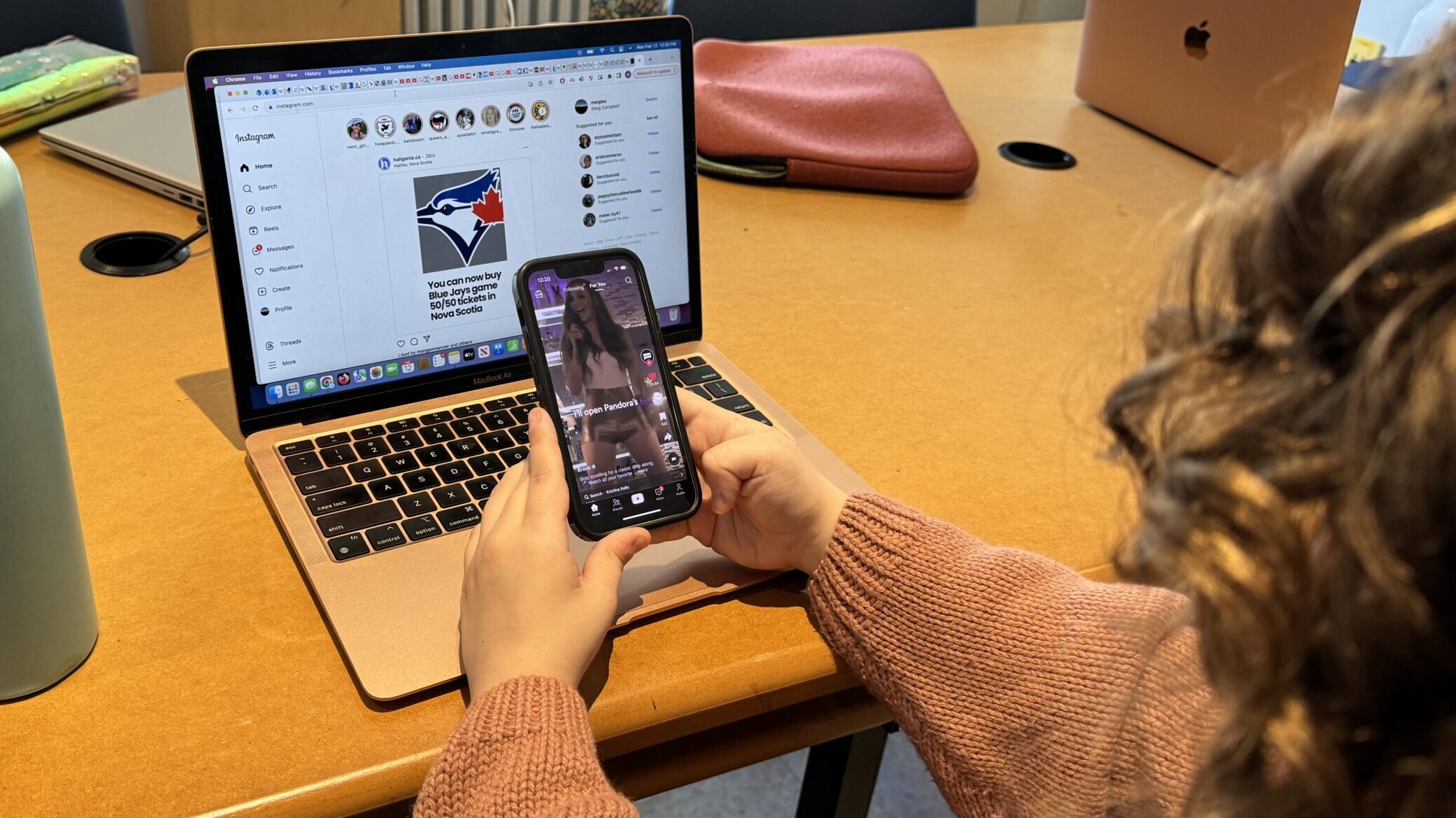Altering ‘what is normal’: Experts caution against overuse of social media
Too much is not always addiction, but behavioural compulsion, psychologist says

caption
A TikTok user watches a video on her cellphone with Instagram open on her laptop.Haylee Landry’s average daily screen time is around seven hours, most of which is spent scrolling on TikTok. She says while the app is entertaining, it has worsened her social anxiety.
“I always think people are judging me,” said the first-year Nova Scotia Community College student. Landry says comment sections on social media allow people to easily express their opinions. But in person, that’s not always the case.
“When you’re in public, (people) are obviously not going to say anything to your face. And then you’re like, ‘Oh well, what are they really thinking of me?’ ” she said.
Steven Smith, a psychology professor at Saint Mary’s University, said that unlike other habits, the negative effects of overconsuming social media aren’t always clear.
“If you’re eating badly and you’re not exercising, you’re going to gain weight. You’re going to notice clothes get tighter,” he said. “If you’re on social media too much, you’re probably not going to notice any obvious physical effects of that.”
He said the more time a person spends online, the less time they will spend being physically social. In turn, this decreases the number of positive social experiences a person has, according to Smith.
“The fewer positive experiences you have in social situations, the more anxious you’re going to be in those social situations,” he said.
Todd Leader said social media is designed to keep you hooked. Leader is a registered social worker and the former president of the Public Health Association of Nova Scotia.
For many who are trying to reduce something they frequently do, such as using social media, he said the issue at hand is impulse control.
Addiction and behavioural compulsion
Leader said understanding overconsumption of social media as an addiction is “vague.” Instead, recognizing overconsumption as a behavioural compulsion, rather than an addiction, offers a practical framework for coping.
Traditionally, the word addiction referred to a dependency on a substance, such as alcohol, he said. When that chemical is taken away, a person undergoes withdrawal and experiences a craving.
A compulsion, however, describes an intense urge to do something, such as open Facebook.
Leader said addressing overconsumption of social media as a behavioural compulsion is useful but it requires more than education.
“Knowledge clearly isn’t the magic cure here,” he said. “That’s why despite how much you know about the effects of sodium, sugar and fat, you probably still eat pizza or donairs.”
He believes placing a barrier between a person and the trigger is important. This means creating more distance between an individual and their access to social media.
“It’s like not having any unhealthy food in your house. You can go get it anytime you want. But that distance and time to go get it somewhere at a store, that’s a barrier between trigger,” said Leader.
He suggested leaving a phone in your vehicle for a few hours or shutting it off. This creates a delay and causes a little bit of pain.
“It forces my brain to realize, ‘Oh, I don’t have it. OK, do I really want to get it?’ ” he said.
Effects of overconsumption
A 2023 study from the Children’s Hospital of Eastern Ontario found that 48.3 per cent of adolescents used social media for three or more hours per day. And, heavy social media use, defined as three or more hours per day, was associated with an increase in the odds of severe psychological distress.
The Mayo Clinic advises that unhealthy social media use among teenagers can disrupt sleep, expose users to online predators and encourage disordered eating habits.
Clinical therapist Gary Su, who works at an adolescent treatment centre, says overconsumption of social media is becoming more problematic among teenagers in their formative years of life.
Su, who works at Venture Academy, a youth adolescent treatment centre in Alberta, said, “More people, young people that I’m working with, they not only struggle with substance use, they also struggle with electronic use.”
“What is presented on social media is becoming more extreme and our definitions of what is normal changes,” said Su.
Landry said she experiences this. She said sometimes she feels like she is not doing enough.
“I see these 20-year-olds are literally wearing Louis Vuitton and Dior and they’re going to the Super Bowl,” she said. “When it’s constantly in your face, it makes you feel bad.”
Physically restricting access to social media and delaying this access for as long as possible is critical, Leader said. The longer someone can wait before using a substance, such as social media, the less chance a person will have of developing a problem later in life.
“If I had the magic government wand, I would probably be targeting that issue of the age,” Leader said.
Landry reflects on the absence of social media in her childhood. In conversation with her parents, she realized the days before social media were different.
“You actually had real-life conversations with people,” she said. “You actually met people and had genuine bonds with them.”
About the author
Raeesa Alibhai
Originally from Toronto, Raeesa Alibhai is in her fourth-year of the Bachelor of Journalism (Honours) Program at King's. She is fond of all forms...
